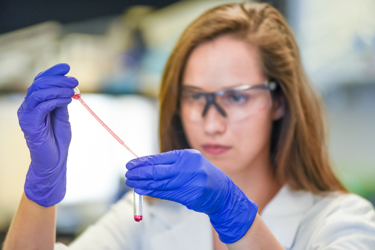Why Astellas And Adaptimmune Are Partnering On STEM-Cell Therapies

By Ed Miseta, Chief Editor, Clinical Leader

One of the greatest hurdles an immune system faces when fighting cancer is that it can’t see the tumors. Because cancer cells look a lot like a person’s own cells, it is difficult for the immune system to recognize tumors as something it should attack.
Adaptimmune is attempting to overcome this hurdle with its SPEAR (Specific Peptide Enhanced Affinity Receptor) T-cell platform. The platform works to engineer a patient’s own T-cells to be able to identify cancer. After a patient’s own T-cells are armed with Adaptimmune’s engineered receptors, these enhanced T-cells can then target and destroy cancer cells across multiple types of solid tumors.
“We are now able to design the receptor on the surface of the T-cells that is meant to recognize and see the cancer,” says Adrian Rawcliffe, CEO of Adaptimmune. “When our SPEAR T-cells recognize the cancer as something “foreign”, the T-cells can attack the tumor in the same way your body attacks a cell that is infected with a virus.”
Adaptimmune removes some of a patient’s T-cells to be able to arm them with its engineered T-cell receptors that can see cancer. The patient’s T-cells are sent to the company’s manufacturing facility in Philadelphia. Genes that make the engineered T-cell receptor are then inserted into the patient’s T-cells to enable these cells to attack cancer once they are given back to the patient. Those cells are then grown and made active before being re-inserted into the patient.
Limitations Of An Autologous Treatment
One limitation of this treatment is that it is autologous – meaning it is dependent on getting cells from each patient, engineering them, and returning them to the patient. Every patient is treated with their own T-cells. Unfortunately, those T-cells cannot be given to another patient, as their immune system would recognize them as foreign and attack and kill them. This individualized aspect of autologous treatment is a limitation of Adaptimmune’s first generation products. Researchers, such as those working at Adaptimmune, hope the next generation of cell therapies will be ‘off-the-shelf’ cells that could be given universally to any cancer patient.
 Adrian Rawcliffe CEO of Adaptimmune |
“When we have off-the-shelf cell therapies, we will no longer manufacture cells for each individual patient,” stated Rawcliffe. “We could manufacture our engineered cell therapies, ship these cells to hospitals, and have them available to eligible patients when they walk through the door. This would be a much simpler and less expensive process than our current autologous cell therapies.”
To produce an off-the-shelf cell therapy product, one must be able to produce cells that will not be recognized by a patient’s immune system as foreign. It is also required that these off-the-shelf therapies not be reactive to the patient’s own cells.
Adaptimmune is now working with Astellas to make an off-the-shelf platform a reality. In January 2020, the two companies signed an agreement to co-develop and co-commercialize a stem-cell derived off the shelf product, also known as allogeneic CAR-T and TCR T-cell therapies.
Some companies working on allogeneic cell therapies have opted to take an approach which extracts stem cells from multiple donors. They then engineer these cells to cloak them from a recipient’s immune system and make them safe for patients. Rawcliffe believes the problem with that approach is that it is very difficult to get these T-cells to be completely invisible to a patient’s immune system. Eventually, the immune system will recognize them, meaning the treatments may only have short-term effects.
“We have seen that it sometimes takes a relatively long time for cell therapies to eliminate solid tumors,” notes Rawcliffe. “For a large bulky tumor, the process could take months. For that reason, there is no sense in using cells that will be quickly recognized and destroyed by a patient’s own immune system.”
A Different Approach
To address solid tumors with an allogeneic platform, Adaptimmune opted to take a slightly different approach. The company is using human pluripotent stem cells. For these types of stem cells, only one donor is needed.
“With this approach, you start with one stem cell line which is grown through multiple cycles to differentiate it into T-cells,” says Rawcliffe. “You can grow as many of them as you want. When we begin our work, they are stem cells, not T-cells. There are multiple steps of gene engineering and differentiation to not only make these stem cells into T-cells but also to remove anything from them that would be recognized by a potential patient’s own immune system. After the cells are grown into T-cells, we can then put the same type of genes into them that we use in our autologous platform to enable these cells to attack cancer. These cells can then be scaled up and can theoretically be given to any cancer patient with multiple types of tumors. This has been a technical challenge for our industry, and although we are not in the clinic yet, we believe we have made substantial progress.”
Last year, Adaptimmune was able to derive functional T-cells from the stem cells. T-cells have been shown to be able to kill target cancer cells in an in vitro assay. Rawcliffe states the deal with Astellas came about because of the progress that has been made.
“With cell therapies, manufacturing is always a concern. For that reason, considerable investment has been made in our manufacturing process,” said Rawcliffe. “Ultimately, we have to be able to manufacture the product. We designed this allogeneic process to be scalable in a good manufacturing practice. We do not use feeder cell lines that help the cells develop. We also do not use media containing human serum because that can be difficult and complex to source.”
Although there are challenges in manufacturing cell therapies and taking them through clinical testing, Rawcliffe believes similar challenges have been overcome in the past. He points to the advancements made by the industry in moving from small molecule drugs to biopharmaceuticals and monoclonal antibody drugs such as Humira and Rituxan.
“Those treatments are very different from the drugs that came before them,” he says. “The manufacturing of those treatments was very complicated, but that didn’t keep companies like Genentech, Amgen, MedImmune, and Biogen from becoming successful with them. I believe the same is now true of cell therapies. Cell therapies are a new modality of therapy that have their own benefits and challenges. Thus far, the benefits are clear. The first wave of CAR-T treatments have shown astonishing response rates. Patients are receiving living cells that will do things that small molecules can't. If you can realize those benefits, the hurdles of manufacturing and conducting clinical trials are worth overcoming.”
Find The Best Partner
When Adaptimmune opted to select a pharma company to partner with on development and commercialization for an “off-the-shelf” cell therapy, it knew the company would need expertise in the cell therapy space. According to Rawcliffe, the selection process was quite competitive. Adaptimmune has a leading platform in the space, and not many companies are working on “off-the-shelf” cell therapies. Although other potential partners presented Adaptimmune with more money upfront, the reason for selecting Astellas had a lot to do with Astellas’ prior acquisition of Universal Cells – a company Adaptimmune has a long-term collaboration with on its allogeneic cell therapy platform.
Universal Cells was a small private company when Adaptimmune partnered with them in 2015 to collaborate on the development of allogeneic T-cell therapies. In 2018, Universal Cells was acquired by Astellas.
Rawcliffe believes it’s best to strike deals with companies you trust. His trust in Astellas was built over time. “We had a long-term relationship with Universal Cells, and we were aware of their parent company’s (Astellas’) growing interest in cell therapies,” stated Rawcliffe. “When it comes time to commercialize these products, Astellas has the global reach we will need. They recognized and were supportive of our ambitions in this space.”
